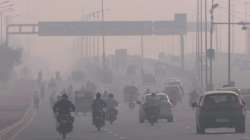Delhi-NCR air pollution to have greatest impact on pregnant women and infants, warn doctors
Delhi-NCR's air pollution is a silent killer that poses a significant threat to the health of pregnant women and infants. The toxic air not only affects their immediate health but can also have long-term consequences. It is high time that we take urgent action to address this issue.

The air quality in Delhi-NCR has been a matter of grave concern for several years now. The region has been consistently ranked as one of the most polluted cities in the world, with dangerously high levels of air pollutants such as particulate matter (PM2.5 and PM10), nitrogen dioxide, and ozone. This alarming pollution level has not only impacted the health of the general population but has also posed a serious threat to pregnant women and infants.
According to the doctors, Delhi-NCR's air pollution is not just harmful to pregnant women and infants, but it can have a lasting impact on their health and well-being. They have warned that the toxic air in the region can lead to various complications during pregnancy and have long-term effects on the health of newborns.
According to Mint report, Dr Dhiren Gupta, the senior paediatrician at Sir Ganga Ram Hospital said, "Once you are exposed in pregnancy, there is a very high chance that an unborn newborn will be allergic later on."
He also added, "Nowadays every road is like a smoking zone. It not only affects patients who are allergic or have asthma but also normal people."
Dr Sandeep Nayar, Principal Director, Chest and Respiratory Diseases, BLK-Max Super Speciality Hospital said, "This is a gas chamber. If you go out, there is irritation in the eyes and pain in the throat of everyone. Our OPD has shot up 20–30 percent. When the poisonous air goes into the body, it will affect every organ."
The Effect on Pregnant Women
Pregnancy is a crucial period for both the mother and the developing fetus. Any exposure to pollutants during this time can have adverse effects on the health of both. The toxic air in Delhi-NCR contains harmful chemicals and particles that can easily enter the bloodstream of pregnant women through their respiratory system. These pollutants can then reach the developing fetus through the placenta, causing various complications.
The Effect on Infants
Newborns and young infants are more vulnerable to the harmful effects of air pollution as their lungs and immune systems are still developing. The toxic air in Delhi-NCR can have a severe impact on their delicate bodies, leading to various health problems.
Exposure to air pollution has been linked to respiratory illnesses such as asthma, bronchitis, and pneumonia in infants. The tiny particles present in the air can easily enter their lungs and cause inflammation and damage to the respiratory system, making them more prone to respiratory infections. Moreover, infants who are exposed to high levels of air pollution during their first year of life are at a higher risk of developing chronic respiratory diseases later in life.
Air pollution has also been linked to cognitive and behavioural problems in children. Studies have shown that children who grow up in highly polluted areas have a higher risk of developing ADHD, autism, and other developmental disorders. The toxic chemicals in the air can affect the development of their brain and nervous system, leading to long-term cognitive impairments.
What Can Be Done?
The impact of air pollution on pregnant women and infants is a serious issue that needs immediate attention. The alarming levels of pollution in Delhi-NCR demand urgent action from both the government and the citizens.
The government must take stringent measures to control and reduce air pollution in the region. This includes implementing stricter emission norms for industries, promoting the use of clean energy sources, and enforcing regulations on vehicular emissions. The government should also invest in better monitoring systems and public awareness campaigns to educate people about the dangers of air pollution.
As individuals, we can also take steps to protect ourselves and our families from the harmful effects of air pollution. Pregnant women and infants should avoid going out during peak pollution hours and wear masks when they do go out. It is also essential to keep indoor air clean by using air purifiers, and plants, and avoiding the use of incense sticks and candles. Breastfeeding mothers should also take care of their diet and avoid consuming foods that contain high levels of pollutants.
ALSO READ: EXPLAINED: The connection between Air Pollution and Type 2 Diabetes